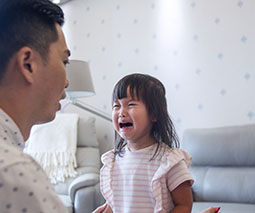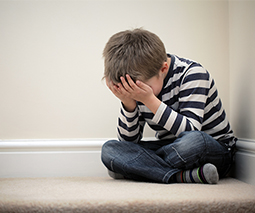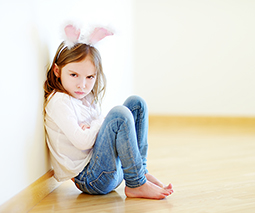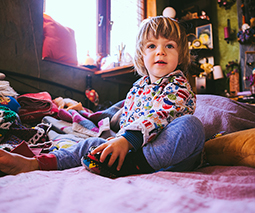How the words we use with our kids shapes their future

“Don’t call me buddy mum, I’m not a boy!”
These words from my daughter stopped me in my tracks. I believe in the power of language and I’m careful about how I speak (and treat) my daughter and son. I had consciously decided that I would not use outdated gendered tropes in the way I interact with them.
The obvious stuff is easy. Both boys and girls need to be able to express their emotions – tears are not frowned upon. Clothing is up to the individual – skirts and shorts aren’t assigned to any particular sex. There are no boys or girls’ toys, colours or jobs.
Outside our front door, the world may still be grossly unequal but inside – I had it down pat! Or did I? I wondered what it meant that while they both get “sweetheart” and “darling”, I seem to reserve “buddy” just for him.
Annabelle Lukin is an Associate Professor in Linguistics at Macquarie University. She says that the way we use language is largely predetermined by the world we live in.
Listen to Annabelle Lukin on Feed Play Love:
Why sexist language is a fact of life
In many ways, how we think and act around gender is subconscious. It’s been hard-wired into the way we think and speak. How many times have you asked a baby’s sex when it’s born? It’s the most natural first question, but Annabelle argues that this kind of unconscious gender bias can have a profound impact on a child’s life.
“Here in Australia your gender matters in really profound ways. A woman will retire on typically half the superannuation of a man. There’s a gender pay gap at work. Your chance of being sexually harassed if you’re a woman is much greater than if you’re a man.
“The world is very gendered and as parents, we’ve been raised in a very gendered world.”
It doesn’t take much to see how language reflects this inequality – even when you think you’re a feminist. What kind of occupations do you think of when you hear the term ‘women’s work’? Do you ever put a sex in front of a title like CEO, scientist or footballer? Chances are if you do, it will be female.
And when you make it clear to children that different roles are gendered, you limit what they believe they can do.
Challenging the status quo
According to research conducted in 2007, adults speak an average of 16,000 words per day. That’s a lot of words to be aware of, particularly when you’re a parent who is juggling a million other things at the same time as watching what you say.
Still, you can make a conscious choice to challenge the status quo.
Annabelle, a mum of a boy and a girl, said she set herself a project. She made a conscious effort not to define different professions by gender. She made sure she didn’t say female CEO or female scientist.
“I’m trying to monitor my own speech carefully so that I signal something to my kids about these occupations not carrying the gender that they still seem to carry.”
Actions speak louder than words
Annabelle says that language doesn’t exist in a vacuum, “You can’t divorce it from action, and you can’t divorce it from society and culture.”
This became very apparent to her when she realised there was one question she was never able to ask in her family.
“I realised sometime last year that I was the only member of my family who never got to say, ‘What’s for dinner?’ And that really started to bug me, so we now have a cooking roster.
“I’m still doing more cooking than anyone else, but the others are stepping up. I’ve opened up this new linguistic world for myself where I can come home and say, ‘What’s for dinner?’”
It all comes down to your own values
Raising children today can feel like studying for a PhD. There are a thousand things we are told about how to raise our kids to be happy, successful and secure. With every new piece of information, it can feel like you’re being pulled further and further away from parenting in a natural way.
I aim for a parenting style that sits somewhere between the relaxed attitude of the ’80s, and the informed parenting we are experiencing today.
With that in mind, I’ll be taking Annabelle’s advice and see how it fits with my own world.
I don’t think calling my son “buddy” is as important as both my kids seeing my husband and I share the domestic roles equally. I will be more conscious now of how I describe a person’s role, and I’ll continue to insist that there are no boy or girl toys, clothing or work.
That way, they will grow up in a home that values equality, and hopefully, they will carry that out into the wider world.









